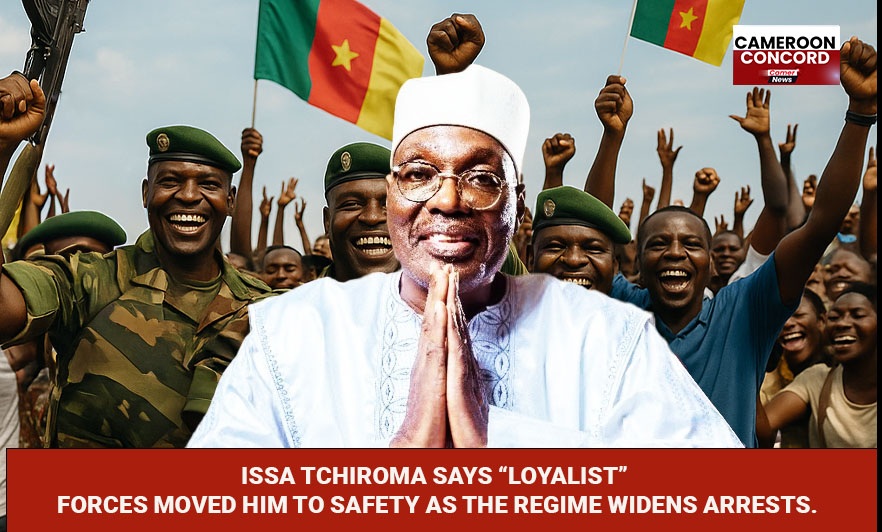- Details
- Politics
Signs of Rift in Cameroon Military After Move to Protect Tchiroma
[YAOUNDE, Oct 31] – Cameroon’s post-election standoff took a dramatic turn on Friday after President-elect Issa Tchiroma Bakary revealed that he is no longer at his residence in Garoua and is now under the protection of what he called a “loyalist army,” a wording that immediately raised questions about unity inside the country’s defence and security apparatus.

In a message issued in the morning, Tchiroma thanked “the loyalist army which showed patriotism by taking me to a safe place and is currently protecting me,” adding that he would deliver a solemn address. The statement came less than 24 hours after he denounced the abduction in Garoua of two members of his family and his personal cook — operations that, according to allies, bore the marks of the same regime militias and special units that have been moving around the northern city since the Constitutional Council announced the disputed result. By using the expression “loyalist army,” Tchiroma was drawing a line: loyalty, in his framing, is no longer defined as obedience to the embattled 92-year-old Paul Biya but as fidelity to the October 12 popular vote whose original polling-station PVs, published in a public drive and confirmed by party monitors, gave him the lead nationwide and a sweeping victory in the Grand Nord. In this reading, the forces who helped him leave Garoua quietly did so to stop an imminent attempt to arrest or neutralize the man who is claiming the people’s mandate.
This episode follows a pattern already observed this week. Another prominent figure, Professor Aba’a Oyono, was prevented from reaching Tchiroma earlier; now it is Professor Charlemagne Messanga Nyamding, a well-known CPDM academic and former IRIC lecturer, who was told to get back on his plane after landing in Garoua to meet the president-elect. Two different personalities, two different backgrounds — both blocked from seeing the same man. That convergence points to one thing: the regime is trying to isolate Tchiroma physically to break the momentum of the street.
While the man at the centre of the storm is being shielded, repression has not slowed. In Limbe/Victoria, in the South-West, security forces — gendarmerie, police and other units acting jointly — launched sweeping arrests Friday morning around New Town and Westend junction, forcing parents, riders and traders to sit on the ground before loading many of them into vans toward the Central Police Station, according to eyewitness accounts collected by Cameroon Concord. People were picked up with or without ID cards, a method that has become common whenever Yaounde feels its authority challenged. It is the same script: target ordinary citizens, create fear, drain the streets.
The timing is not accidental. On Saturday, Cameroonians in France are expected at Place de la République in Paris for a protest against the “stolen” election and to back Tchiroma’s call for a transition. The regime knows that every picture from Paris, Berlin, Johannesburg or Toronto makes it harder to sell the Constitutional Council’s figures to the outside world, especially now that several Western capitals, including Paris and Ottawa, have publicly expressed concern over the killings and called for the release of those arbitrarily detained.
For Tchiroma’s camp, today’s move proves two things. First, that he was indeed the main target of the post-proclamation operations around Garoua. Second, that the security forces are not monolithic. As we have reported since Oct. 27, some units in the North have chosen de-escalation, even fraternizing with demonstrators; others have taken positions to protect the president-elect’s residence; yet another group, described by locals as regime-leaning or operating from private compounds near Tchiroma’s home, opened fire on supporters, killing and wounding civilians. The existence of a “loyalist” strand inside the military — loyal to the nation and to the expressed will of the ballot box — is precisely what Yaounde fears. Once soldiers start saying they will not shoot at their own people for a leader who just lost an election, the repression machine begins to crack.
Tchiroma, for his part, tied his personal safety to that of those already in custody: “To all those who were arbitrarily arrested, to the members of my family who were kidnapped, hold firm — I will not rest until this regime gives you back your victory.” It is consistent with his previous messages after the killings in Douala, Garoua, Bertoua and Bafang, where he framed the bloodshed as a “grave mistake” by a regime that chose bullets over dialogue. His references to a “third phase” of the struggle, and to the example of a neighbouring country in 2010 where a partisan constitutional court proclaimed the loser and still lost the political battle, set the tone for the days ahead: sustained civil resistance, diaspora mobilization and renewed pressure on the military not to become an instrument of private rule.
What happened today in Garoua is therefore more than a security episode. It is a political signal. The regime is still trying to encircle, arrest and silence; but Tchiroma is still free, still speaking, and still calling for ghost towns from Nov. 3 to 5. Between these two lines — the people in the streets and an old power clinging to decrees — stands an armed force that is beginning to choose. If more units join what he calls the “loyalist” side, the balance of the post-electoral confrontation could shift faster than Yaounde thinks. Cameroon Concord will continue to monitor the situation in Garoua, Limbe and Yaounde as it unfolds.
- Details
- News Team
- Hits: 872
